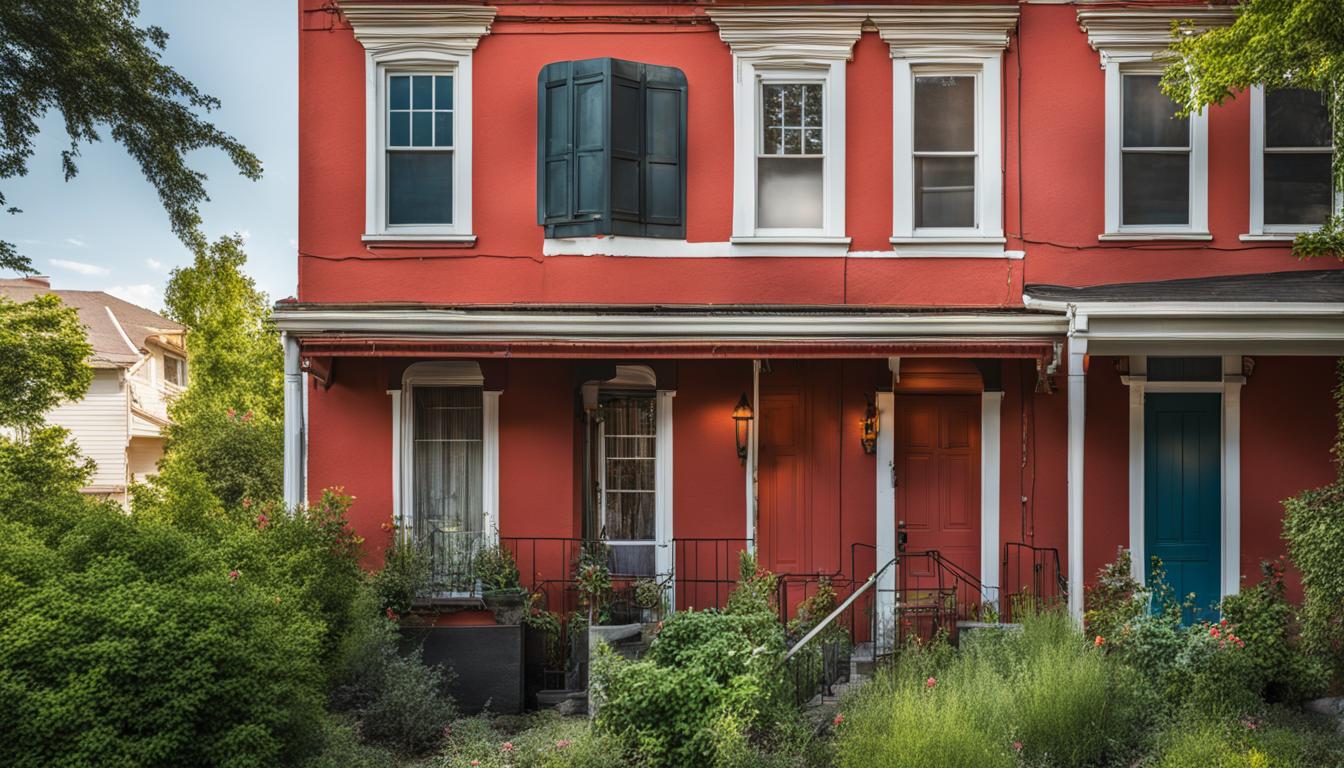Renting versus buying is a decision that many people face when it comes to finding a place to live. While there are valid reasons for wanting to buy a home, it’s important to understand the financial implications and consider whether renting is simply throwing money down the drain.
Homeownership does have its advantages, such as the ability to build equity over time. However, the amount of equity you’re building each month may be lower than expected, particularly in the early years of your mortgage. Additionally, there are ongoing costs associated with owning a home, such as mortgage interest, taxes, insurance, and maintenance.
On the other hand, renting can provide flexibility and lower upfront costs compared to buying a home. Renting also means that you aren’t responsible for repairs and maintenance expenses. However, it’s essential to weigh these benefits against the potential equity-building and tax advantages of homeownership.
Key Takeaways:
- Renting versus buying a home is a significant financial decision.
- Homeownership allows you to build equity over time, but the amount may be lower than anticipated, especially in the early years.
- Owning a home comes with additional costs such as mortgage interest, taxes, insurance, and maintenance.
- Renting offers flexibility and lower upfront costs, but you miss out on equity-building and potential tax advantages.
- The decision to rent or buy depends on individual factors such as time horizon, financial situation, and local market conditions.
Equity Building as a Homeowner
As a homeowner, one of the advantages is the opportunity to build equity with each monthly mortgage payment. However, it’s important to understand that not all of your payment goes towards building equity. A significant portion of the payment is allocated to paying interest, especially in the early years of your mortgage.
For example, with a 30-year fixed-rate mortgage, only a small percentage of your monthly payment goes towards paying down the principal in the first five years. This means that the amount of equity you’re building may not be as substantial as you initially expected.
To illustrate this, consider the following table:
| Year | Principal | Interest | Total Payment | Equity Built |
|---|---|---|---|---|
| 1 | $2,500 | $7,500 | $10,000 | $2,500 |
| 2 | $3,000 | $7,000 | $10,000 | $5,500 |
| 3 | $3,500 | $6,500 | $10,000 | $9,000 |
This table demonstrates how the equity built increases over time as more of your monthly payment goes towards paying down the principal. It’s important to have realistic expectations and not overestimate the amount of equity you’ll have until you sell the property. However, as you continue to make mortgage payments, you will gradually build equity in your home.
The Costs of Homeownership
While homeownership offers the opportunity to build equity, it’s important to consider the costs associated with owning a home. In addition to mortgage payments, there are other expenses that can be considered “wasted money” compared to the fixed costs of renting. These costs include:
- Mortgage Interest: Unlike renting, where your monthly payment is fixed, a significant portion of your mortgage payments go towards paying interest in the early years.
- Taxes: Homeowners are responsible for property taxes, which can be a significant expense depending on the location and value of the property.
- Insurance: Homeowners must have insurance to protect against potential damages or liabilities. This is an additional cost to consider.
- Maintenance Costs: Unlike renters who rely on landlords for repairs, homeowners are responsible for all maintenance and repair expenses.
These costs can add up and should be factored into your decision-making process when considering renting versus buying. They can have a significant impact on your monthly budget and overall financial well-being.
Table: Comparing Costs of Renting and Owning a Home
| Renting | Owning | |
|---|---|---|
| Monthly Cost | Fixed rent payment | Mortgage payment (includes principal, interest, taxes, insurance) |
| Equity Building | No equity | Building equity through mortgage payments |
| Responsibility for Maintenance | Landlord responsible | Homeowner responsible (can be costly) |
| Flexibility | Easier to move | Requires selling or renting out the property |
It’s important to note that while there are “wasted” costs associated with homeownership, there are also potential benefits such as building equity and potential tax deductions. However, the decision to rent or buy should be based on a thorough analysis of your financial situation, long-term goals, and local market conditions. Remember to consider all the costs, both financial and non-financial, before making a decision that aligns with your overall objectives.
Transaction Costs of Buying
When considering the decision to buy a home, it’s important to take into account the transaction costs involved. These costs, often overlooked, can significantly impact your financial situation and should not be underestimated. Transaction costs are the expenses incurred during the process of buying and selling a home, and they can add up quickly.
One of the major transaction costs of buying a home is the closing costs. These costs include fees for various services such as appraisals, inspections, title searches, and legal fees. On average, closing costs can range from three to five percent of the home’s purchase price. For example, if you’re buying a home for $300,000, you can expect to pay $9,000 to $15,000 in closing costs. These costs are typically paid out of pocket and are not included in the mortgage loan.
Additionally, when you eventually decide to sell your home, you may have to incur closing costs again. This means that you’ll have to pay another three to five percent of the sale price in fees. It’s important to keep these costs in mind when weighing the financial benefits of buying a home. While homeownership can provide long-term advantages, the transaction costs can eat into any potential gains you were hoping to make.
| Transaction Cost | Percentage of Purchase Price |
|---|---|
| Closing Costs | 3-5% |
| Selling Costs | 3-5% |
Table: Average transaction costs as a percentage of the home’s purchase price.
Understanding the transaction costs of buying a home is essential for making an informed decision. While buying a home can provide stability and potential long-term financial benefits, it’s important to weigh these benefits against the upfront and ongoing costs. By factoring in the transaction costs, you can have a more realistic view of the true cost of homeownership and make a decision that aligns with your financial goals.
Benefits of Renting
While homeownership has its advantages, there are also significant benefits to renting a home. Renting provides flexibility, allowing you to easily change your location or move to a different property based on your needs. This flexibility is particularly beneficial for individuals who frequently relocate for work or personal reasons. Renting also offers lower upfront costs compared to buying a home, as you typically only need to provide a security deposit and the first month’s rent to move in.
One of the main advantages of renting is the peace of mind it provides in terms of repairs and maintenance. As a renter, you are not responsible for major repairs or unexpected maintenance costs that may arise. The landlord or property management company is typically responsible for handling these issues, which can save you time, money, and stress. Additionally, renting allows you to avoid the ongoing expenses associated with homeownership, such as property taxes, homeowners insurance, and regular maintenance.
“Renting provides flexibility, lower upfront costs, and peace of mind in terms of repairs and maintenance.”
Table: Renting vs. Buying Cost Comparison
| Expense | Renting | Buying |
|---|---|---|
| Upfront Costs | Lower – security deposit and first month’s rent | Higher – down payment, closing costs, and other fees |
| Monthly Expenses | Fixed – rent remains the same throughout the lease term | Variable – mortgage payments, property taxes, insurance, and maintenance |
| Flexibility | High – ability to easily move or change locations | Low – selling a home can be a lengthy and complex process |
In terms of financial planning, renting offers greater flexibility and allows you to allocate your funds towards other investments, savings goals, or experiences. It gives you the opportunity to test out different neighborhoods or property types before committing to a long-term investment. Renting can also be advantageous if you prefer a low-maintenance lifestyle, where you can focus on work, travel, or hobbies without the responsibilities associated with homeownership.
While renting may not provide the same level of long-term financial benefits as homeownership, it offers valuable advantages in terms of flexibility, lower upfront costs, and peace of mind. Ultimately, the decision to rent or buy should be based on your personal preferences, financial situation, and long-term goals.
Renting vs Buying Considerations
Deciding whether to rent or buy a home can be a complex decision that depends on various factors. It’s essential to consider your time horizon, financial situation, and the economics of your local area before making a choice. Here are some key considerations to help you weigh the options:
Time Horizon
Your time horizon refers to how long you plan to stay in the same location. If you anticipate moving within a few years, renting may be a more suitable option as it provides flexibility and avoids the costs associated with buying and selling a home. On the other hand, if you plan to settle down in the area for at least five years or more, purchasing a home could offer personal and financial stability in the long run.
Financial Situation
Your financial situation plays a significant role in determining whether renting or buying is the better choice. Consider factors such as your income stability, debt levels, and ability to save for a down payment. Owning a home requires a more significant upfront investment, including a down payment and closing costs. If your financial situation is stable and you have the means to cover these costs, buying a home may be a viable option.
Economics of Local Area
The economics of your local area can also influence your decision. Rental and housing markets vary by location, and it’s important to consider factors such as rental prices, home prices, and mortgage rates. In some areas, renting may be more affordable than buying, while in others, it may be more cost-effective to invest in homeownership. Research the local market conditions to determine which option aligns better with your financial goals and affordability.
Ultimately, the decision to rent or buy depends on your individual circumstances and priorities. Consider these factors, along with other personal considerations, in order to make an informed choice that suits your needs and long-term goals.
Signs You’re Ready to Buy a Home
Are you tired of throwing away money on rent payments? Do you dream of settling into a neighborhood and enjoying the stability of homeownership? If so, there are several signs that indicate you may be ready to take the leap and buy a home.
- Steady Employment: Lenders consider employment history and stability when qualifying you for a mortgage. Having a steady job shows that you have the funds to repay your debt, making it easier to get approved for a mortgage.
- Saving for Down Payment: Saving for a down payment and other homeownership expenses is a crucial step in the homebuying process. While it’s a common myth that you need a 20% down payment, there are various loan programs that offer lower down payment options or even no down payment requirements.
- Managing Debts: Lenders also consider your debt-to-income ratio when assessing your mortgage qualification. Keeping your debts at a manageable level improves your chances of getting pre-approved for a mortgage.
- Good Credit Score: Maintaining a good credit score is essential in the homebuying process. Your credit score influences the amount you can borrow and the interest rate you’ll receive.
- Settling in a Neighborhood: If you’re ready to put down roots and settle in a particular neighborhood, homeownership provides the stability and sense of belonging that renting often lacks.
These signs indicate that you may be ready to transition from renting to homeownership. However, it’s important to carefully consider your personal and financial situation before making a decision. Assessing your time horizon, financial stability, and local market conditions will help you determine if buying a home is the right choice for you.
Remember, homeownership is a significant financial commitment, so make sure you’re fully prepared before taking the plunge. By being aware of these signs and considering all the relevant factors, you can make an informed choice and embark on the journey towards owning your own home.
Table: Comparing Renting and Buying Considerations
| Renting | Buying | |
|---|---|---|
| Monthly Payments | Rent payments can increase over time | Mortgage payments can be stable or increase with adjustable-rate mortgages |
| Equity Building | No equity building | Potential for equity building over time. Building equity depends on the portion of the mortgage payment that goes towards the principal. |
| Upfront Costs | Lower upfront costs | Higher upfront costs, including down payment and closing costs |
| Responsibility for Repairs and Maintenance | Landlord is responsible for repairs and maintenance | Homeowner is responsible for repairs and maintenance |
Image:
Rising Rent Payments: Higher than Mortgage and Trapped with Uncertainty
Rising rent payments can be a significant financial burden, often exceeding the cost of a monthly mortgage payment for a single-family home. This situation can leave renters feeling trapped with uncertainty as they face mounting expenses without the potential benefits of building equity. As rent prices continue to increase, many individuals are considering homeownership as a way to stabilize their housing costs and gradually build equity in their largest asset.
When comparing rising rent to a mortgage payment, it’s essential to take into account the potential for price appreciation in the housing market. While rent payments typically increase with inflation, homeownership allows individuals to lock in their monthly mortgage payment, potentially providing long-term savings as rental prices continue to rise. Moreover, as homeowners pay down their mortgage, they gradually build equity that can be used for future investments or as a financial safety net.
“Rising rent can create a sense of financial instability and uncertainty for individuals, making it challenging to plan for the future. Buying a home offers the stability of consistent mortgage payments and the opportunity to build equity over time.”
Comparing Rent and Mortgage Payments
To illustrate the contrast between rising rent and mortgage payments, let’s consider a hypothetical scenario in which the average monthly rent for a one-bedroom apartment in a certain area is $1,500, while the monthly mortgage payment for a similar-sized home is $1,300. Over the course of five years, the total rent paid would amount to $90,000. This is money that the renter will never recoup or gain any financial benefit from. On the other hand, the homeowner who paid $1,300 per month in mortgage payments would have paid a total of $78,000 over the same five-year period, with a portion of that going towards building equity.
Breaking Free from Renting
While renting provides flexibility and lower upfront costs, rising rent payments can push individuals to consider the benefits of homeownership. By purchasing a home, individuals can escape the uncertainty of rent increases and gain the stability of consistent mortgage payments. Additionally, homeownership allows individuals to personalize their living space, build a sense of community, and potentially benefit from tax deductions.
- Freedom from rising rent prices
- Stability and control over housing costs
- Potential to build equity and long-term financial stability
Before making the decision to transition from renting to homeownership, it’s important to carefully evaluate financial readiness, long-term goals, and the local housing market. While rising rent payments can be a driving factor, it’s crucial to consider personal circumstances and ensure that becoming a homeowner aligns with both short-term and long-term objectives.
Steady Employment and Financial Stability
Having a stable employment history and a steady income are crucial factors when it comes to getting approved for a mortgage. Lenders typically look for a history of at least two years with the same company or in a similar field to ensure that you have the financial stability to make your mortgage payments. This employment history provides lenders with the confidence that you will be able to repay your debt consistently.
Freelancers and gig economy workers can still qualify for a mortgage if they can demonstrate a steady income for a couple of years. Providing documentation, such as tax returns or contracts, can help substantiate your income and increase your chances of mortgage approval.
Table: Steps to Improve Mortgage Approval Chances
| Steps to Improve Mortgage Approval Chances | |
|---|---|
| 1. Maintain a stable employment history | |
| 2. Demonstrate a steady income for at least two years | |
| 3. Keep your debt-to-income ratio at a manageable level | |
| 4. Maintain a good credit score |
A stable job and income lower the risk for lenders, making it easier for you to get approved for a mortgage. It’s important to establish a consistent work history and maintain steady employment to strengthen your financial position and increase your chances of mortgage approval.
Saving for Down Payment and Closing Costs
One of the biggest challenges for many prospective homebuyers is saving enough money for a down payment and covering closing costs and other homeownership expenses. However, it’s important to note that the traditional belief that you need a 20% down payment to qualify for a mortgage is a myth. There are alternative loan programs available that offer lower down payment options or even no down payment requirements, making homeownership more accessible.
Table: Down Payment and Closing Costs Comparison
| Down Payment Amount | Closing Costs | Total Homeownership Expenses |
|---|---|---|
| 20% or more | Typically 3-5% of the home’s price | Down payment + closing costs + ongoing expenses |
| Less than 20% | Can vary, depending on the loan program | Down payment + closing costs + ongoing expenses |
| No down payment | Can vary, depending on the loan program | Closing costs + ongoing expenses |
As shown in the table above, the total homeownership expenses consist of the down payment, closing costs, and ongoing expenses such as property taxes, insurance, and maintenance. By exploring alternative loan programs and understanding the various costs involved, prospective homebuyers can make a more informed decision about their budget and financial goals.
It’s important to start saving early and create a realistic savings plan to ensure that you have enough funds to cover these expenses. Consider setting up automatic transfers to a dedicated savings account each month, cutting unnecessary expenses, and exploring potential sources of down payment assistance or grants that may be available in your area. By taking proactive steps to save for a down payment and closing costs, you can move closer to achieving your goal of homeownership.
Managing Debts and Credit Score
When considering the decision to buy a home, managing your debts and maintaining a good credit score are important factors that can impact your mortgage qualification. Lenders assess your debt-to-income ratio as part of the mortgage approval process. This ratio compares your monthly debt obligations to your monthly income and helps lenders determine your ability to repay a mortgage successfully.
It is crucial to keep your debts at a manageable level to improve your chances of getting pre-approved for a mortgage. By reducing your outstanding debt and maintaining a good credit score, you demonstrate financial responsibility and increase your eligibility for favorable loan terms and interest rates.
Here are a few tips to help you manage your debts and improve your credit score:
- Create a budget and track your expenses to ensure you are not overspending.
- Pay your bills on time to avoid late payment fees and negative impacts on your credit score.
- Reduce your credit card balances and avoid maxing out your credit limits.
- Avoid opening new credit accounts or taking on additional debt before applying for a mortgage.
- Regularly check your credit report for errors and dispute any inaccuracies promptly.
“Managing your debts and maintaining a good credit score are crucial for mortgage qualification. Lenders want to ensure that you have the financial capacity to make timely mortgage payments. By keeping your debts under control and displaying responsible credit behavior, you enhance your chances of securing a mortgage and obtaining favorable terms.”
By following these guidelines and adopting healthy financial habits, you can not only improve your chances of qualifying for a mortgage but also set yourself up for long-term financial success. It’s important to remember that managing debts and maintaining a good credit score are ongoing processes that require discipline and consistency. Taking these steps will not only benefit your current mortgage application but also serve you well in future financial endeavors.
Conclusion
When it comes to the decision of whether to rent or buy a home, it’s important to weigh the options carefully. Consider both personal and financial considerations to determine the best path for your long-term goals.
Renting offers flexibility and lower upfront costs, making it a suitable choice for those who value mobility and don’t want to be burdened by the responsibilities of homeownership. On the other hand, buying a home allows you to build equity and potentially benefit from tax deductions, providing both personal and financial advantages.
To make an informed decision, consider your time horizon, financial situation, and the economics of your local area. Determine how long you plan to stay in one location, assess your financial stability, and evaluate the costs and benefits associated with buying a home in your specific market.
Ultimately, the choice of homeownership or renting depends on your unique circumstances. Take the time to carefully evaluate the pros and cons, weigh the options, and make a decision that aligns with your long-term goals and financial aspirations.
FAQ
Is renting throwing money down the drain?
Renting is often seen as throwing money away because you don’t build equity like you do with homeownership. However, there are valid reasons for wanting to rent instead of buying a home.
How much equity do homeowners typically build each month?
The amount of equity you build each month as a homeowner is determined by the portion of your monthly mortgage payment that goes towards paying down principal. In the early years, a significant portion goes towards interest rather than principal, which limits the amount of equity you build.
What are the costs of homeownership?
In addition to mortgage payments, homeowners also have to consider the costs of mortgage interest, property taxes, homeowners insurance, homeowners association fees, and ongoing maintenance costs. These expenses can add up and be considered “wasted money” compared to the fixed costs of renting.
What are the transaction costs of buying a home?
When buying a home, you can expect to pay closing costs, which can range from three to five percent of the home’s price. When you sell the property, you may have to pay another three to five percent in closing costs or more. These transaction costs can eat into any gains you were hoping to achieve from the sale of your home.
What are the benefits of renting?
Renting provides flexibility, lower upfront costs compared to buying a home, and peace of mind in terms of not being responsible for repairs and maintenance.
What factors should I consider when deciding to rent or buy?
The decision to rent or buy depends on factors such as your time horizon, financial situation, and the economics of your local area. It’s important to weigh these factors before making a decision.
What signs indicate I’m ready to buy a home?
Signs you may be ready to buy include being tired of escalating rent payments, having steady employment, saving for a down payment, managing your debts, maintaining a good credit score, and feeling ready to settle in a neighborhood.
Can rising rent payments motivate me to buy a home?
Rising rent payments can be a motivating factor for buying a home, especially if the cost of renting surpasses the monthly mortgage payment of a single-family home.
How does steady employment impact mortgage approval?
Lenders typically want to see a history of steady employment to ensure you have the funds to repay your debt. Freelancers and gig economy workers can still qualify for a mortgage if they can provide proof of a steady income for a couple of years.
Do I need a 20% down payment to buy a home?
It’s a myth that you need a 20% down payment. Various loan programs offer lower down payment options or even no down payment requirements. However, it’s important to save enough to cover closing costs and other homeownership expenses.
How do managing debts and credit score affect mortgage qualification?
Lenders consider your debt-to-income ratio and credit score when determining if you qualify for a mortgage. Managing your debts and maintaining a good credit score improve your chances of getting pre-approved for a mortgage.
Source Links
- https://www.forbes.com/sites/rogerma/2016/07/12/are-you-really-just-throwing-your-money-away-when-you-rent/?sh=734cd0a672a5
- https://affordanything.com/is-renting-better-than-buying-should-i-rent-or-buy/
- https://www.linkedin.com/pulse/7-signs-you-ready-stop-renting-finally-buy-your-first-kip-barnard






